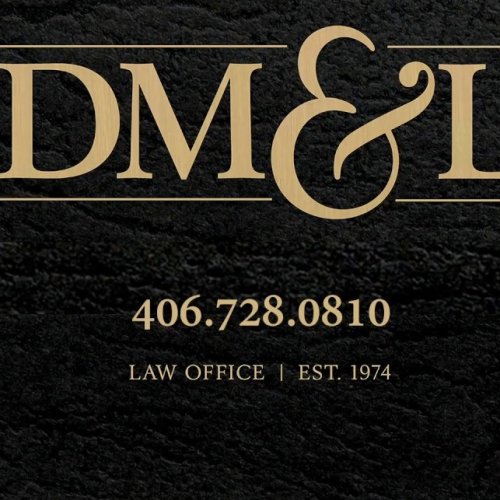Best Natural Resources Lawyers in Montana
Share your needs with us, get contacted by law firms.
Free. Takes 2 min.
Or refine your search by selecting a city:
List of the best lawyers in Montana, United States
About Natural Resources Law in Montana, United States
Montana is renowned for its vast landscapes and rich abundance of natural resources, including water, minerals, forests, and wildlife. Natural resources law in Montana encompasses a wide array of statutes, regulations, and case law that govern the use, conservation, and protection of these resources. The state is tasked with balancing the interests of landowners, tribal nations, mining operations, recreational users, and conservationists while ensuring sustainability for future generations. Managing water rights, public land usage, wildlife management, and resource extraction activities are among the critical areas governed by Montana's natural resources laws.
Why You May Need a Lawyer
Individuals and businesses may require legal assistance in natural resources matters for many reasons. Common situations include:
- Resolving water rights disputes, especially agricultural or ranching concerns
- Navigating the permitting process for mining, drilling, or logging activities
- Addressing land ownership and access issues, including public versus private rights
- Defending against or pursuing environmental enforcement actions
- Negotiating conservation easements and land use agreements
- Addressing disputes related to wildlife habitat protection and hunting/fishing rights
- Representing interests in public land leasing or grazing rights
- Complying with federal, state, and tribal regulations on resource use
- Participating in public hearings and environmental impact assessments
- Protecting property from environmental contamination or hazardous development
Legal guidance ensures that your interests are protected, that you comply with complex regulations, and that you are prepared to respond to any conflicts or claims involving natural resources.
Local Laws Overview
Montana's legal landscape regarding natural resources is shaped by a mix of state statutes, constitutional provisions, federal law, and tribal treaties. Some of the most important local legal considerations include:
- Water Law: Montana follows the doctrine of prior appropriation, meaning "first in time, first in right" for water usage. Water rights must be legally recognized and disputes are handled through the Montana Water Court.
- Mining and Mineral Rights: Laws like the Montana Hard Rock Mining Act and the Strip and Underground Mine Reclamation Act regulate exploration, permitting, extraction, and reclamation activities for minerals and coal. Surface rights and mineral rights can be separately owned.
- Public Land Management: State and federal agencies manage significant amounts of land in Montana. State laws set rules on grazing, recreation, and leasing, while the federal government regulates national forests, parks, and BLM lands.
- Wildlife and Habitat Protection: The Montana Fish, Wildlife & Parks Department administers rules for hunting, fishing, and conserving habitats. State and federal protections exist for endangered or threatened species.
- Environmental Protection: The Montana Environmental Policy Act (MEPA) requires environmental reviews for major state actions, and the federal National Environmental Policy Act (NEPA) impacts federal projects. The Department of Environmental Quality (DEQ) enforces regulations on air, water, and land pollution.
- Tribal Rights: Several Native American tribes hold treaty and statutory rights related to natural resources management and use within the state, especially on reservation lands.
Because these laws frequently change and interact with federal and tribal frameworks, legal expertise is crucial when navigating Montana's natural resources issues.
Frequently Asked Questions
What are water rights and why are they important in Montana?
Water rights determine who can use water from rivers, lakes, or underground sources and how much they can use. In Montana, these rights are critical due to the state's large agricultural sector and the doctrine of prior appropriation, which rewards the earliest users.
How do I know if I own the mineral rights to my land?
Ownership of surface land does not always include mineral rights. A title search and legal review of your property deed can reveal whether mineral rights have been severed or sold separately in the past.
Can I access public land through private property in Montana?
Access to public land through private property is only allowed if an easement exists or the property owner grants permission. Trespassing laws apply if you enter private land without consent.
What permits are required for mining or drilling operations?
Mining, oil, or gas activities generally require state and sometimes federal permits, including environmental assessments, reclamation plans, and compliance with land use and safety regulations.
How are hunting and fishing rights managed in Montana?
The Montana Fish, Wildlife & Parks Department governs hunting and fishing through licensing, quotas, and special regulations to protect wildlife populations and habitats.
What should I do if a neighbor is polluting my water supply?
You may contact the Montana Department of Environmental Quality to report suspected pollution. Legal action may also be available for damages or to seek injunctive relief. Consulting a lawyer is recommended.
Who do I contact about a conservation easement?
Landowners interested in conservation easements typically work with land trusts, conservation organizations, or government agencies. Legal counsel ensures proper drafting and enforcement of easement terms.
Are there special considerations for natural resource issues on tribal land?
Yes, federal and tribal laws often apply on reservations, and tribal governments have significant regulatory authority. Non-tribal interests should work with both tribal and state agencies when natural resources are involved.
How can I appeal a regulatory decision related to land or resource use?
Appeals processes depend on the specific agency and decision. Some disputes go through administrative hearings, while others may be taken to court. Legal representation improves your chances in these proceedings.
What is the process for resolving disputes over grazing rights?
Grazing disputes often involve contracts, permits, and agency policies. Resolution may require mediation, administrative review, or litigation, depending on the nature of the rights and the parties involved.
Additional Resources
If you need more information or support regarding natural resources in Montana, consider the following organizations and agencies:
- Montana Department of Natural Resources and Conservation (DNRC)
- Montana Department of Environmental Quality (DEQ)
- Montana Fish, Wildlife & Parks (FWP)
- Montana Water Court
- Montana State University Extension office
- Bureau of Land Management (BLM), Montana-Dakotas Office
- US Forest Service - Northern Region
- The Nature Conservancy - Montana
- Montana Association of Conservation Districts
- Relevant tribal governments' natural resources departments
These entities can provide documentation, contacts, and sometimes direct assistance or referrals for legal matters.
Next Steps
If you believe you need legal assistance for a natural resources issue in Montana, consider the following steps:
- Gather all relevant documents, such as titles, permits, leases, or correspondence
- Outline your goals and concerns, including any impending deadlines or agency actions
- Contact a lawyer who specializes in natural resources or environmental law in Montana
- Research available legal aid services, local bar association referrals, or specialty law firms
- Reach out to the appropriate government agency if you need factual or procedural information
- Prepare questions in advance to make the most of your legal consultation
An experienced attorney can help you understand your rights, explain applicable laws, and represent your interests effectively in negotiations, proceedings, or court.
Lawzana helps you find the best lawyers and law firms in Montana through a curated and pre-screened list of qualified legal professionals. Our platform offers rankings and detailed profiles of attorneys and law firms, allowing you to compare based on practice areas, including Natural Resources, experience, and client feedback.
Each profile includes a description of the firm's areas of practice, client reviews, team members and partners, year of establishment, spoken languages, office locations, contact information, social media presence, and any published articles or resources. Most firms on our platform speak English and are experienced in both local and international legal matters.
Get a quote from top-rated law firms in Montana, United States — quickly, securely, and without unnecessary hassle.
Disclaimer:
The information provided on this page is for general informational purposes only and does not constitute legal advice. While we strive to ensure the accuracy and relevance of the content, legal information may change over time, and interpretations of the law can vary. You should always consult with a qualified legal professional for advice specific to your situation.
We disclaim all liability for actions taken or not taken based on the content of this page. If you believe any information is incorrect or outdated, please contact us, and we will review and update it where appropriate.
Browse natural resources law firms by city in Montana
Refine your search by selecting a city.














